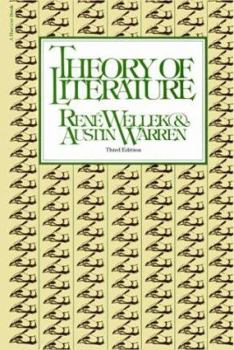Theory of Literature: New Revised Edition
Select Format
Select Condition 
Book Overview
Theory of Literature was originally published in 1949. It is not a textbook introducing the young to the elements of literary appreciation nor a survey of the techniques employed in scholarly... This description may be from another edition of this product.
Format:Paperback
Language:English
ISBN:0156890844
ISBN13:9780156890847
Release Date:January 1984
Publisher:Mariner Books
Length:384 Pages
Weight:0.82 lbs.
Dimensions:0.9" x 5.3" x 7.9"
Customer Reviews
2 ratings
The graduate student's guide to literary criticism
Published by Thriftbooks.com User , 19 years ago
This book was one of the major texts for a graduate degree in English Literature. It seemed to want to give the science of Literature as a field of objective study with a body of learning. If I remember rightly for all its virtues in teaching different ways of analyzing Literature it did not have itself ' the feeling of literature'. It instead suggested that the real life of literature was not in this kind of study, but somewhere else where the private mind and imagination went on in its own way independent of building a body of objective knowledge. Is it possible that I have forgotten almost all of what I so assiduously learned from this ' text' because its whole approach is somehow opposite to where I feel the real life of literature is?
A brilliant achievement
Published by Thriftbooks.com User , 21 years ago
This is a truly remarkable book. The authors sought to unite poetics (literary theory) with criticism (evaluation of literature) with scholarship (research) and literary history (the dynamics of literature in contrast with the statics of theory and criticism). This had to be done in a book of reasonable size, without being eclectic or doctrinaire.The authors succeeded in their aim and the book achieved a vast and somewhat unexpected popularity, especially as a grad student text. It has been in print forever and has been translated into many languages.Much of the burden of writing fell on Rene Wellek because Austin Warren (not to be confused with another friend of Wellek, the poet and novelist Robert Penn Warren) was seriously distracted during the project by the protracted illness and death of his wife. Fortunately the job was in good hands because there is not much doubt that Wellek is the premier scholar of literature in modern times. He combined all-round mastery of many of the specialisms that constitute modern literary studies, encyclopaedic reading in several languages, a humane vision and commitment to reason.The book has four parts, first Definitions and Distinctions; with five chapters including 'The Nature of Literature' and 'Literary Theory, Criticism and History'. The second part, Preliminary Operations has a chapter on the ordering and establishment of evidence. Part three The Extrinsic Approach to the Study of Literature, has five chapters including 'Literature and Biography', 'Literature and Psychology' and 'Literature and Society'. Part four, The Intrinsic Study of Literature, contains eight chapters including 'Style and Stylistics', 'Literary Genres', 'Evaluation' and 'Literary History'.The chapter titled "The Mode of Existence of a Literary Work of Art" is especially interesting because it gives the lie to the claim that modern literary theory and criticism (exemplified by the deconstructionists) have achieved an unprecedented level of philosophical sophistication. They worked through five possibilities, referring to "the poem" as shorthand for any sort of literature, or perhaps any cultural artefact.1. The poem is a physical artefact consisting of marks on paper, or the grooves on a Babylonian tablet.2. The poem is the sequence of sounds uttered by a speaker, reading aloud.3. The poem is the experience of the reader.4. The poem is an expression of the experience of the author.5. The poem is a stratified complex of values, which cannot be reduced to any of the previous four theories.They rejected (1) because a poem can be preserved in a purely oral tradition. Also the precise physical form of the work is not crucial. Hamlet is the same regardless of the size of the pages or the typeface or errors in typesetting or translation of particular editions.They dismissed (2) because we do not read for the sounds alone, we read for plot and character and much more besides. As for (3) they argued that readers are influenced by all manner





